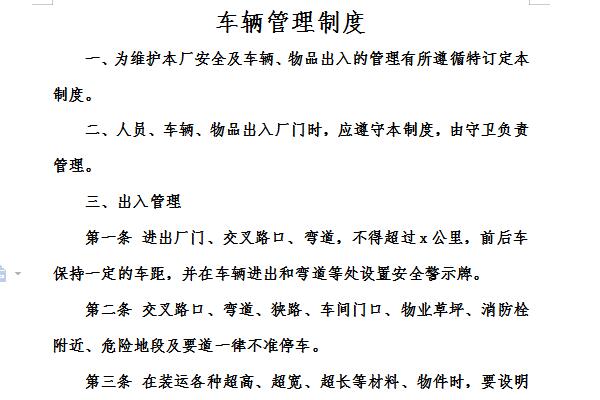
Contents of Vehicle Management Measures
Article 1 The company has formulated these regulations in order to unify and rationalize vehicle management and effectively use various vehicles.
Article 2: Vehicles for official use shall be managed by the general affairs department, and shall be registered and managed according to vehicle number.
Article 3 Each user or driver of a Class A vehicle for official use shall go to the designated inspection station for inspection on the specified date. If the vehicle is not inspected within the time limit and is fined, the cost shall be borne by the user or driver.
Article 4 Except for the driving license and insurance card that are carried by each user, the incidental information of various vehicles used for official purposes is kept by the general affairs department and shall not be lost. If the vehicle is transferred, the vehicle registration procedures must be completed and the vehicle registration must be transferred. This data is transferred with the vehicle.
Article 5 The employment, dismissal, rewards and punishments of drivers in these regulations shall be handled in accordance with the company's personnel management rules and will not be separately formulated.
Article 6 Employees of our company who often go out to perform business due to their duties may purchase vehicles for business use in accordance with these Measures and the following provisions.
Characteristics of vehicle management measures
1. Authoritative. The management system is formulated by the authoritative management department and is mandatory and binding within its scope of application. Once formed, it cannot be modified or violated at will.
2. Integrity. An organization's management system must include all implementation matters and cannot omit any. If new implementation matters are discovered or arise, a management system should be formulated accordingly to ensure that all matters are "lawfully followed."
3. Exclusivity. Once a certain management principle or management method is established, other practices that conflict with it cannot be implemented; Universal applicability within a specific scope. Various management systems have their own specific scope of application. Within this scope, all similar matters must be handled according to this system.
4. Enforceability. The management system established by the organization must be executable and cannot deviate from the organization's own affairs and become a dead letter.
5. Relative stability. Once the management system is formulated, it cannot be easily changed within a normal period of time, otherwise its authority cannot be guaranteed. This stability is relative. When the current system does not conform to the changed actual situation, it needs to be revised in time.
The editor recommends:
The vehicle management method is a free template. You can download the source file for you to edit, modify and replace. Huajun Software Park also providesSmall business financial systems and processes,Small company financial systemdownload.






































it works
it works
it works